

Grammar. Power. ENGB1 POWER. Gender. ENGB1 Lang and Tech. Language and power. Who, what, why: Why did Joey Barton put on a French accent? 27 November 2012Last updated at 10:06 ET.
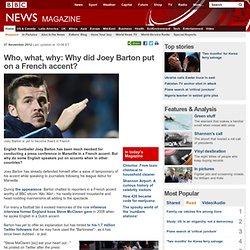
Sentence and clause. Last changed 29 May 2003 Sentences and Clauses - introduction There are four types of sentence: A clause is a group of words which acts as a single unit and is built round a verb, for example:
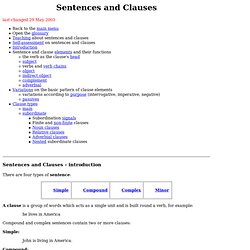
10 sneaky pieces of thief slang. Why Slang Is Good For You. Today's program puts special attention on language and identity — how they coincide and why those intersections matter.
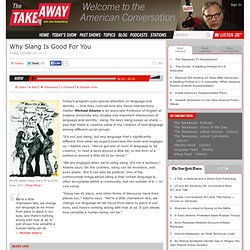
Martha Robinson: Teenspeak is not for adults - Commentators - Voices. Some seem out of date (has anyone actually said "whack" since the 1990s?)
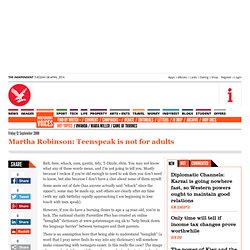
, some may be made up, and others are clearly after my time (with my 19th birthday rapidly approaching I am beginning to lose touch with teen speak). However, if you do have a burning desire to ape a 14-year-old, you're in luck. The national charity Parentline Plus has created an online "teenglish" dictionary at www.gotateenager.org.uk to "help break down the language barrier" between teenagers and their parents. A very concise dictionary of student slang. Student slang is a rapidly changing lingo, and you don't want to get caught out during freshers week confusing "hench" with "dench".
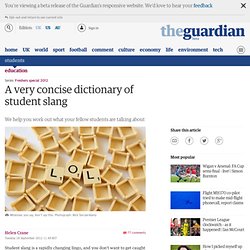
In the interests of preserving your cool, here's our glossary of well-worn faves. Feel free to add local variants and new witticisms in the comments. Bare Not actually anything to do with nudity, bare is an adjective meaning "a lot of", or "obviously". 35 classy slang terms for naughty bits from the past 600 years. Men and women: are we really worlds apart? - Features. Do women and men talk differently?
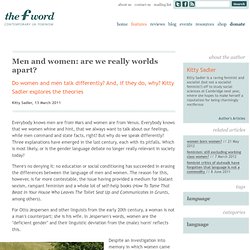
And, if they do, why? Kitty Sadler explores the theories Kitty Sadler, 13 March 2011 Everybody knows men are from Mars and women are from Venus. Everybody knows that we women whine and hint, that we always want to talk about our feelings, while men command and state facts, right? Representing gender in children's reading materials.
Would a boy have been shown with flowers in the 1970s?

Are girls and boys portrayed differently in children’s reading materials today than in the past? During the 1970s and 80s, studies of children’s reading materials found that males not only featured more than females but also they tended to take the lead roles and were more active than their female counterparts, who were often restricted to traditional stereotyped roles. Many of these earlier studies of gender in children’s reading material analysed the texts based on their content, which meant that researchers made their own judgements about what was sexist and what was not. Now, however, advances in computer and electronic technology mean that ‘corpus linguistics’ can be used to analyse texts more systematically.
Using this method, John Macalister set about answering the question of how far gender roles in writing for children had changed since the 1970s. Russell Howard's good news - Bic pens for women. Women: Know Your Limits! Harry Enfield - BBC comedy. "Danger, Women at Work" 1940s. Gender Free Language Test. Susan Sarandon: 'Feminism is a bit of an old-fashioned word' Susan Sarandon photographed in Los Angeles for the Observer by Steve Schofield 2013.
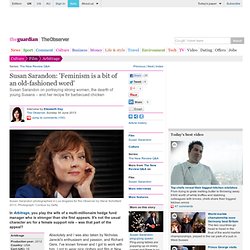
Photograph: Contour by Getty In Arbitrage, you play the wife of a multi-millionaire hedge fund manager who is stronger than she first appears. It's not the usual character arc for a female support role – was that part of the appeal? Office workers use 'pointless jargon' Heists and mayhem: the language of crime. There has been a lot on British minds recently, with horsemeat and obesity coming high on the list of preoccupations.
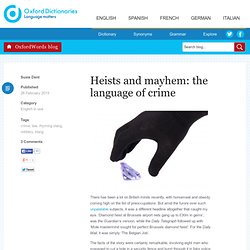
But amid the furore over such unpalatable subjects, it was a different headline altogether that caught my eye. ‘Diamond heist at Brussels airport nets gang up to £30m in gems’, was the Guardian’s version, while the Daily Telegraph followed up with ‘Mole mastermind sought for perfect Brussels diamond heist’. For the Daily Mail, it was simply ‘The Belgian Job’.
Why do politicians use business jargon? 5 February 2013Last updated at 19:46 ET Going forward.
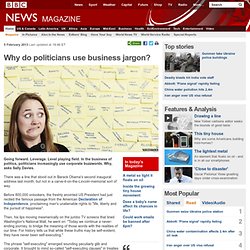
Leverage. Level playing field. In the business of politics, politicians increasingly use corporate buzzwords. Language in Conflict - Language in Conflict. HSBC 'demises' jobs – another absurd business euphemism. Advertising and Language: The Power of Words. It is possible that the evolution and progress of humanity have, as a deeper root, our communication skills.
The use and abuse of language has allowed us to push our thinking to the outside - or distort its content - and send misleading messages, which in disciplines such as marketing can severely affect the level of persuasion a brand would like to achieve on its consumers. Countless campaigns are developed around the world with the sole purpose of positioning products and generating massive brigades over the shelves on what are the most powerful retail chains in the world. Both Advertising and Marketing use graphical, textual, verbal or sound communication tools in order to construct messages that lead to consumption of products and services that are offered by a brand that invests in these efforts of persuasion. Here are some variables that are influential in the development of messages designed to communicate brand value: Yes, we are judged on our accents. If a Liverpudlian child had aspirations to be a doctor, would the fact that he or she pronounced doctor as if spelt with four cs and not one be a hindrance?
Before even buying the Fisher Price stethoscope, should parents take a surgical scalpel to slice out extraneous consonants and sharpen sloppy vowels? Esther McVey, the Liverpool-born employment minister, has said that people should not feel the need to “neutralise” their accents in order to get ahead in life. In a culture as obsessed with class as Britain, it’s a perennial debate. We all know that Lincolnshire lass Margaret Thatcher rubbed out her accent. The Telegraph once presented actual evidence that Cherie Blair had undergone vocal coaching.
Does the taboo still exist? What The British Say (And What They Really Mean) Should you ever find yourself in conversation with a British person and they’re saying things which seem polite on the surface, with perhaps a little undercurrent of scorn, you might want to have this infographic ready to consult. It claims to be a translation of British for people in the European Union, but these themes are universal. Have a look, it’s not bad. Note: I’m not entirely sure where this originally comes from or who made it. The earliest sighting was on this blog by Oxfam. Kapow! The language of comics. Is Texting Killing the English Language? Texting has long been bemoaned as the downfall of the written word, “penmanship for illiterates,” as one critic called it. To which the proper response is LOL. Texting properly isn’t writing at all — it’s actually more akin to spoken language. Rupert Cornwell: Twitter dialect says you are what you tweet - Rupert Cornwell - Commentators - The Independent.
Well not exactly. American English, according to linguistics scholars, is as varied as any language can be. There's midland speech, which breaks down into north midland and south midland, the former prevalent across the Midwest, the latter stretching south to the point where it becomes indistinguishable from southern speech – which itself is anything but monolithic. In turn, midland American English is distinct from the northern variant, which is split between inland north and north central. Then you've got New England English, and California English, and the English they speak in the uppermost parts of the upper Midwest (which to my inexpert ear has a distinctly Canadian timbre to it.) Throw in the accents and verbal peculiarities of the old eastern industrial cities like Boston, Philadelphia, and Pittsburgh and you realise that, far from being homogeneous, the US is home to a veritable linguistic stew.
Op-ed. An op-ed (originally short for "opposite the editorial page") is a piece typically published by newspapers, magazines, and the like which expresses the opinions of a named author usually not affiliated with the publication's editorial board.[1] Op-eds are different from both editorials (opinion pieces submitted by editorial board members) and letters to the editor (opinion pieces submitted by readers). Origin[edit] What Is a Feature Article in Journalism?
Pimp your vocab ... the handbook of student slang. Do you speak geek? - Features - Gadgets and Tech - The Independent. That’s the establishment as represented by grammar purists. The secret world of gang slang - Life & Style - London Evening Standard. Text messaging 'improves children's spelling skills' The pupils, who did not already use a mobile phone, were split into two groups.
Half were given a handset to use for texting over weekends and during the school holidays over a 10-week period. The remaining pupils formed a control group. Academics then gave pupils a series of reading, spelling and phonological awareness tests before and after the study. Texting, tweeting ought to be viewed as GR8 teaching tools, scholar says. The impact of text messaging on the decline of formal writing among teens has been debated in pedagogical circles ever since cell-phone ownership became an adolescent rite of passage in the mid-2000s.
But according to a University of Illinois expert in media literacy, not only are critics who argue that texting is synonymous with literary degradation wrong, they also often overlook the bigger role that texting and its distant cousin, "tweeting," could play in education and research. Phone texting 'helps pupils to spell' Children who regularly use the abbreviated language of text messages are actually improving their ability to spell correctly, research suggests. The word ‘youths’ banned by Ministry of Justice and Dept for Children, Schools and Families code of practice. 'Man on the street' is offensive to women. The suggestions, put forward by Chichester District Council, West Sussex, have been criticised as an example of "repulsive" political correctness. Tony Colpoys, chairman of Ebernoe parish council, West Sussex, said: "This kind of thing really gets my goat - it's not as though anybody in their right mind would believe that the "man in the street" referred solely to the male sex.
Feminism and the English Language. How can I teach my students to write decently when the English language has become a wholly-owned subsidiary of the Academic-Industrial Complex? Language can't stay still - just listen to London - News - London Evening Standard. I h8 txt msgs: How texting is wrecking our language. By JOHN HUMPHRYS. 2b or not 2b: David Crystal on why texting is good for language. Technology. Zoe Williams: The chavs and the chav-nots. The secret plague of women at work: 'manterrupting' A ‘Salty’ Word With a Promising Future. Why we love the language police. Young Women Often Trendsetters in Vocal Patterns.
Linguists are like, ‘Get used to it!’ Can't understand your man? That's because he's speaking 'Menglish' - here's how you can be fluent too. How to speak 'Menglish' - the language 'only men' understand. Johnson: Accents: The last acceptable prejudice. Don't crucify Cumberbatch for 'coloured' gaffe. Benedict Cumberbatch needs to be more careful with words. But we can all learn from his apology. Are 'grammar Nazis' ruining the English language? Is the Innanet RUINING teh English Language??? ¯\(°_o)/¯ Lynne Truss has a grammatical axe to grind. Sorry, there's no such thing as 'correct grammar' Is Texting Killing the English Language? Young people of the internet: can you not (write properly)? Twerking, selfie and unlike? Young people don't speak like that – I should know. English can absorb assault from texting. More on UM and UH. Up in ur internets, shortening all the words. Texting 'is no bar to literacy'
Ralph Fiennes blames Twitter for 'eroding' language. Actor Ralph Fiennes blames Twitter for dumbing down the English language. Um or er: which do you, um, use more in, er, conversation? Diversity. Advertising and changes in language. A2 English Language. AS English Language. Grammar Exercises. Professor Gibson's "Making Words Work: A Guide to Grammar and Usage"
Grammar Girl. Literally – the much misused word of the moment. Please give up your seats for articles less able to stand. Obviously ... the only way is Essex if you want to hear nouveau cockney. Reem. On staycation I scoffed some brawesome spagbol with a spork. Speaking it in the family.
Jafaican it? No we're not. Words are stupid, words are fun. Sexist language: it's every man for him or herself. 10 grammar books to read before you die of boredom. The pedants' revolt: lament for a golden age of grammar that never existed. What Britain's county dialects can tell us about the national character. What Britain's county dialects can tell us about the national character. Mind your slanguage, and don't be an erk. YOLO. Mind your language. The feminisation of madness is crazy. The oddest classical etymologies ever? People always say the same thing about tattoos.
Weekly Reading. A Little Book of Language by David Crystal – review. The Dirty Etymology of 9 Everyday Words. 38 Wonderful Foreign Words We Could Use in English. Txting: the gr8 db8 by David Crystal.